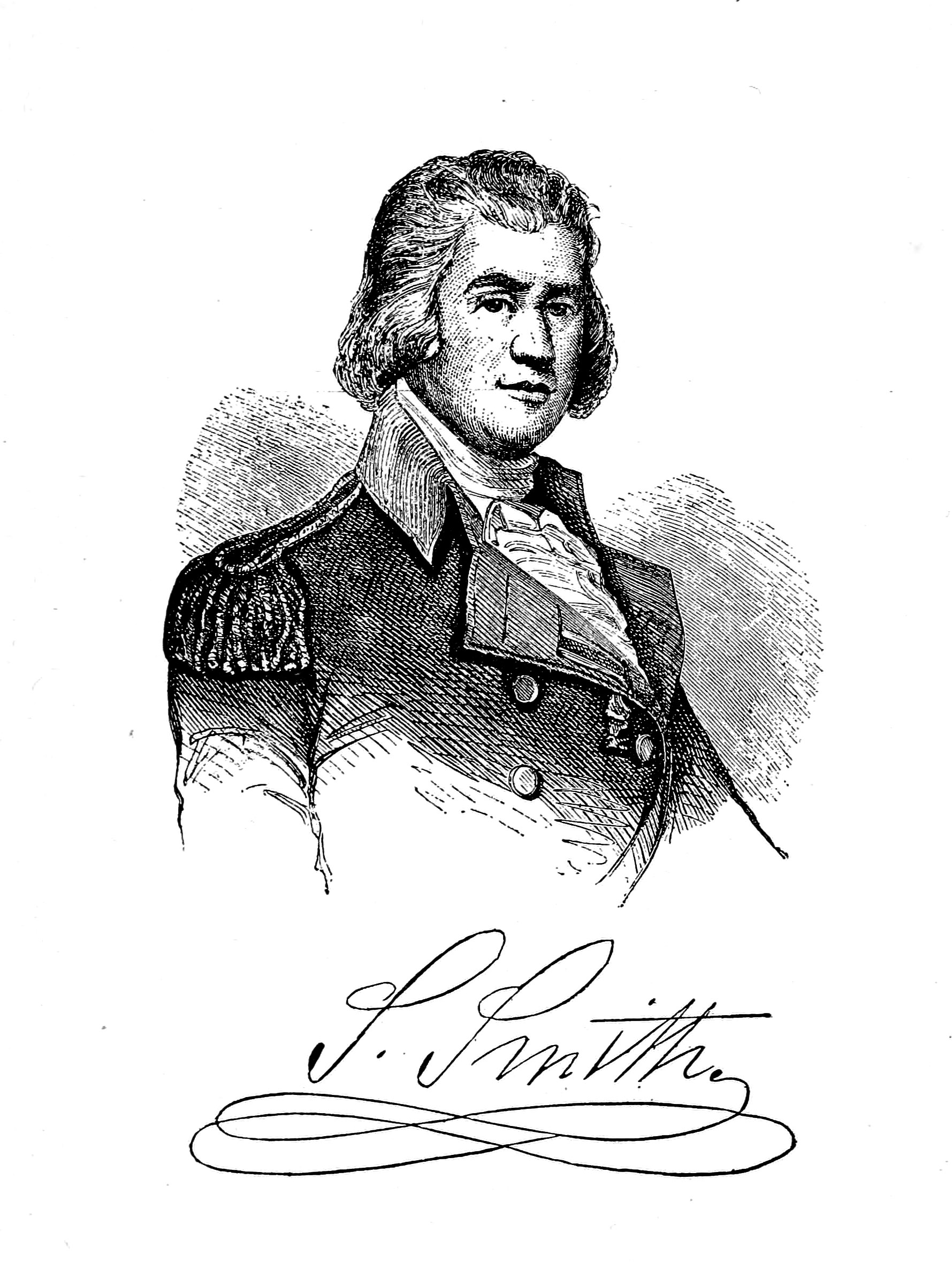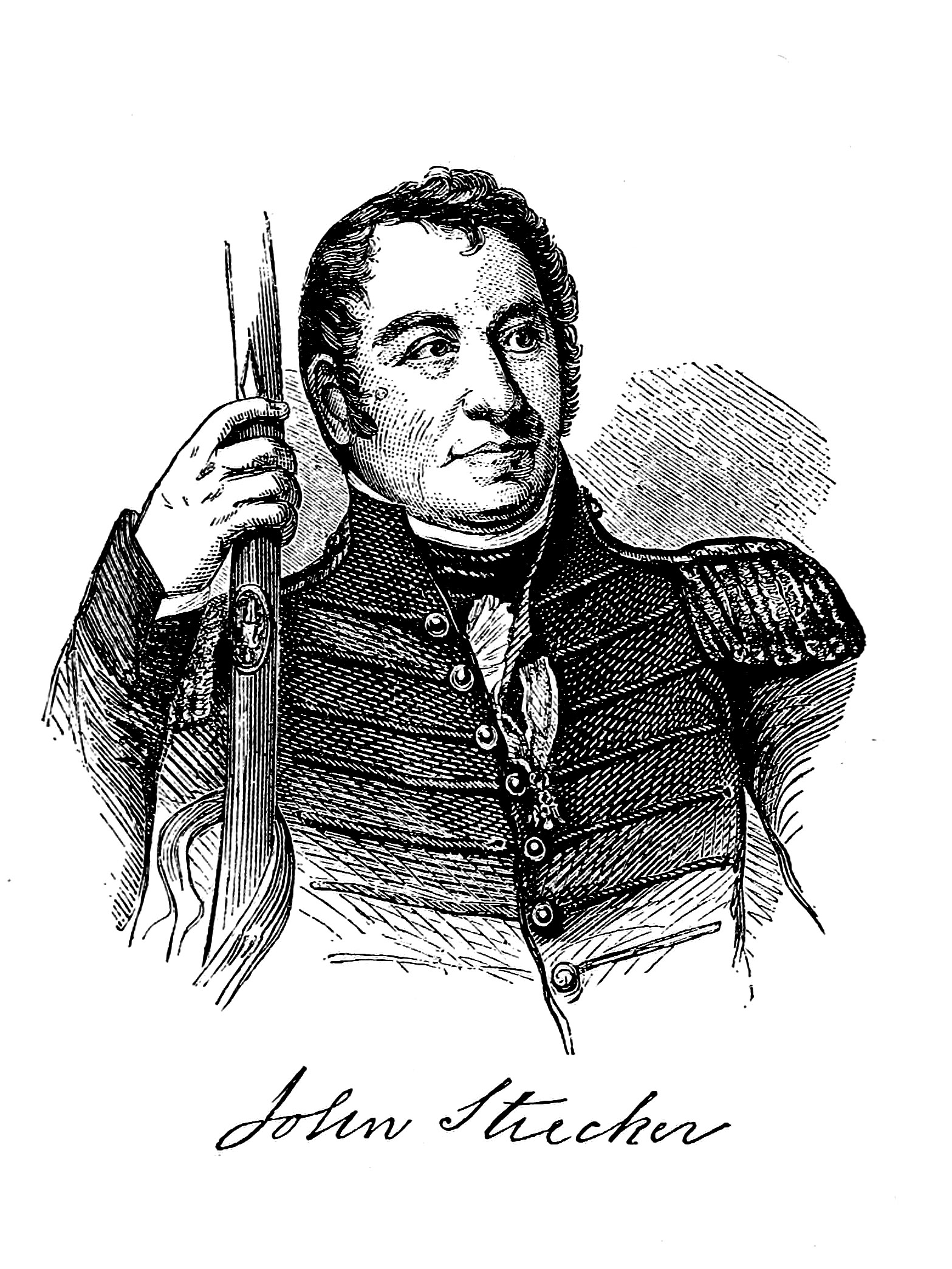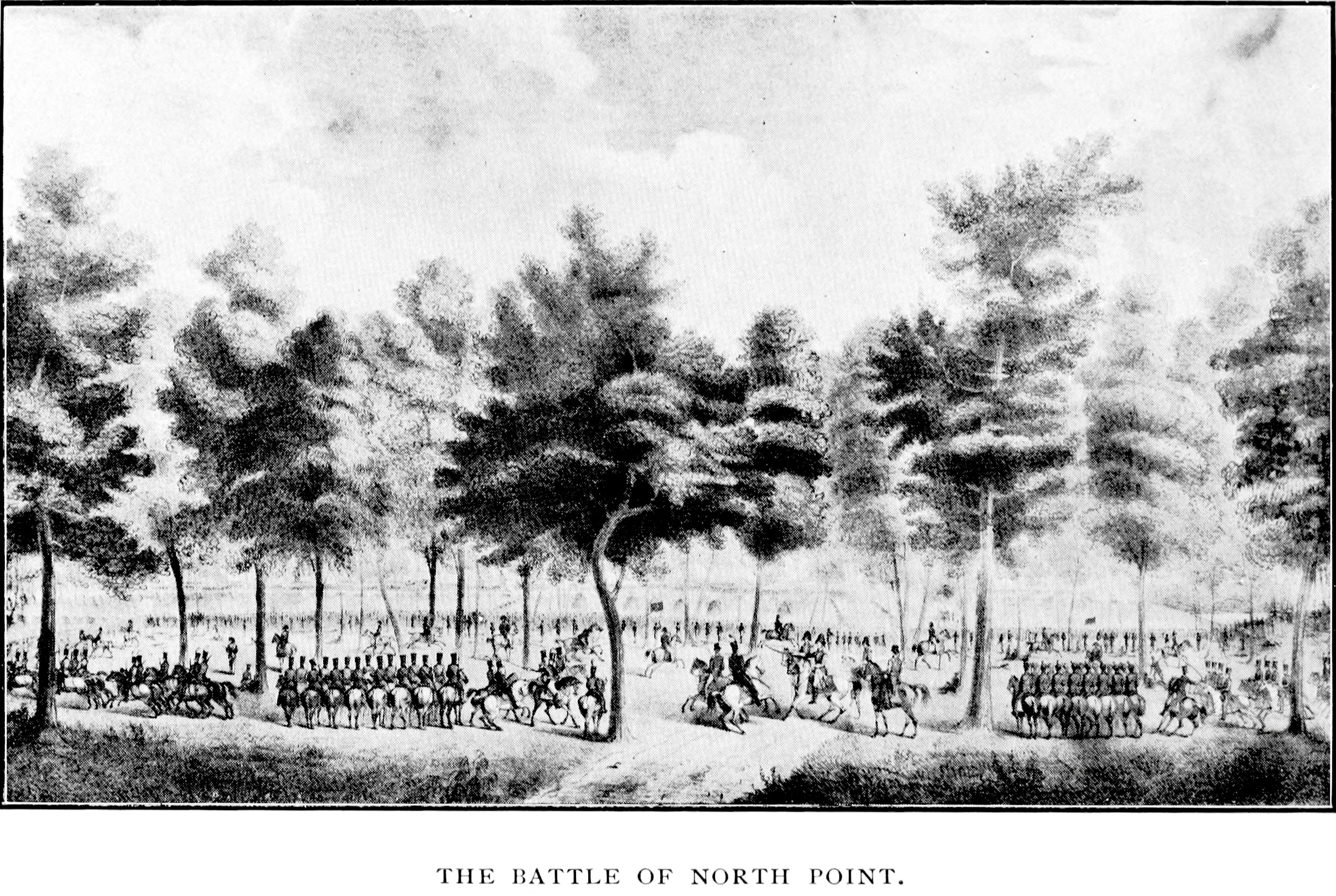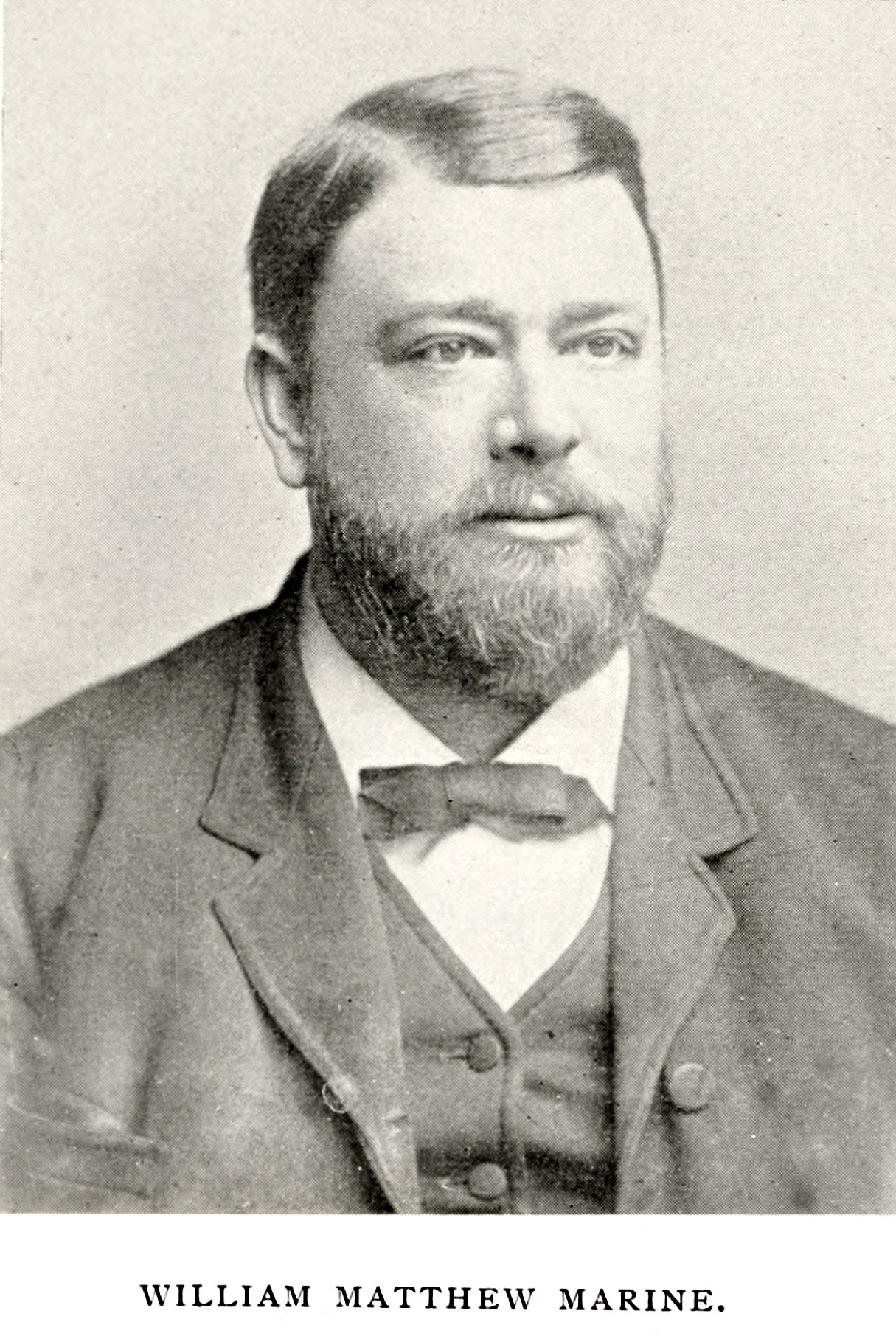THE BATTLE OF NORTH POINT
CANTO I.

The clouds hung o'er the threatened coast, Above the bluff, the shore, the strand, Where the imperial red-coat host, In barges rowed toward the land. Upon the beach, strewn pebbles lay, Smoothed by the water's polishing, Where ebbs and flowing tides held sway, To dashing breakers murmuring. The river rolled great waves of scorn, Indignant at the sight beheld; Its wrath was roused that early morn, And troublous billows dashed and swelled. The Briton crossed the deep to siege, To storm the heights of Baltimore, And wreak his malice and his rage, To light the torch upon this shore. From decks of oak, the soldier proud, Marched in the ranks to serve his King. The sky lay hid beneath a shroud, And gave not back an echoing. The troops were those of Wellington, Listening to notes of martial air— Old tunes heard on the fields he won, Played o'er to please the soldiers' ear. No one opposing, to defy His early march—no saving hand, The starry banner forth should fly O'er melting ranks which must disband. From field of battle, yesterday, Militia raced against the wind, Hastening from Bladensburgh away To covert, difficult to find. Barney and Miller held that field Amid the fiery torrents' flow, With wings of iron slow to yield; Their faces shone in conflict's glow. The sky flamed o'er the capital; Surrounding hills were wrapt in blaze; The stars concealed by lighted scroll, Refused to longer Prepare, oh! Baltimore, prepare, The crisis of your fate has come. Upon your holy altars swear, Your's shall not be the Briton's home.
CANTO II.
The trumpet calls in Baltimore; White tents are on the hillside spread; The hostile force must leave the shore; The earth shakes 'neath defenders' tread. Virginia's sword doth brightly gleam, And o'er Potomac's waters flash; While Penn's sons, in a torrent stream, Across the Susquehanna dash. The rustic for his country's sake, Forthwith to ranks doth now repair; He leaves the shores of Chesapeake— The scene of Peter Parker's snare— Forth from that consecrated sod, To reach the spot of Ross' fate, Where spilling of his heart's best blood, Served not the cause of crafty State. To Parker, Byron's lay was wove, Classic of sentiment and art; To Ross, no sonnet borne of love, Has issued from the gushing heart.
CANTO III.
The sound went forth of breakfast horn, As the notes of a twittering bird; It pierced the mists of early morn; The Briton's heart was gently stirred. Ross weary of the toilsome march O'er lowland, bog, 'mid tangled wood, 'Neath solar rays enough to parch And dry the currents of the blood, Responded to the welcome call, At table with his aids sat down; While there he asked a farmer all The happenings in the distant town. Wrinkles were in the coat Ross wore; Its breast's appearance to improve, The farmer carefully looked o'er The creases, which he sought to smooth. While thus engaged, the General asked, Who held command to save the town; He wished the name to be unmasked Of one enjoying such renown As shielding haunts of cruisers bold, Who stretched more canvas to the gale, And niched a greater sum of gold Than other ships they could outsail. Those privateersmen left deep scars— Unhealing wounds, no time can cure— Inflicted on the English tars By imprint they can ne'er obscure. “To punish rovers calls us here, We shall decree yon city's fate; It has no blade the brave need fear, To bar admission through its gate.” “You'll ne'er reach there,” was the reply; “The town noise is no wedding stir; Chieftains in war have chance to die, For them awaits the pall and bier. Do omens pierce your soul with dread ? Let me a dream to you relate; Forecasts make timid folk afraid; They are the finger prints of fate. I dreamed of hurrying of men, Where smoke hung o'er the field of fight; Flame swept a narrow, hemmed in glen, Which gave to view a startling sight. A crash, like mighty trees had rent, And fallen 'neath the whirlwind's force, Went forth until its sound was spent, And lost to distance in its course. A horseman fell,—he downward sank; I saw his face; I see it now; He held a high, commanding rank, But death was written on his brow. His army routed, baffled, beat, Retired disordered to the wave, Compelled through rain to make retreat, The nightly elements to brave.” Ross felt the depths move in his soul, And in his throat was choking wrath; But self asserted its control, He broke out in a merry laugh. Then said the dashing cavalier, “Militia may like rain outpour, They'll never wake a Briton's fear; We'll run them out of Baltimore.”
CANTO IV.
From o'er the city comes the sound Of booming cannon's loud report; From Federal Hill the stern rebound, To duty, patriots exhort. The deep toned bells of Otterbine, By warnings tell the foeman comes; They ring no longer hymns divine, But airs like those from sounding drums. Alarmists at such times increase— Rumor purveyors of no worth— 'Till swallowed in the crowd, they cease Their bulletins to issue forth; In the mad swirl they disappear, The sergeant's cry doth them affright,— “Fall in, the enemy is near, And share the hazard of the fight.” Love smiles on duty through her tears, And dissipates clouds on her brow; Her bosom heaves with sinking fears, Her loyalty dare not allow; So bravely drying tear-dimmed eyes, She gazes on the bright cockade, And ceases furthermore her sighs, Ashamed she could have been afraid. A poet sings his latest lay, And moves the sympathetic crowd, And, as its echoes die away, Applause is heard to rise aloud. Who dies for country, doth not yield To death's uncompromising sway; He soars immortal from the field, And dwells untouched by time's decay. Fame takes his hand within her clasp, And on his brow writes words of fire; Eternities are held in grasp, Of which the muses never tire; 'Tis sweet to drink of fame e'en here, To wear its blossoms through the hours. If you'd be wreathed, go forth, nor fear The field, there you will find the flowers.

CANTO V.
The regiments are hurried hence, Preceded by a cavalcade. Deeper becomes the great suspense, When Strieker leaves with his brigade. The tumult rolls to mountain heights, And each one's pulse is quick to tell The fluttering of fever's flights, Which in the breasts of freemen swell. In temples, forms bend low with care, While Gruber's face is lit with fire; His deep toned voice repeats a prayer, Which stimulates the worshipper: “Convert King George, oh ! Lord we pray, Pardon his oft transgressions here. To heaven call his soul away, We need him not upon this sphere.” Amen ! had just escaped his throat, When cannon broke in roar without, And jarring bells so loudly smote, The worshippers were put to rout. Glendi, before the waiting crowd— Assembled when the troops passed by— Uttered petition unto God, In faith and deep sincerity: “Oh ! Thou who raised the dead to life, Hear now Thy servant, even me; Be 'midst the flame of coming strife, Thou who once walk'd on Galilee, Protect our sons, and prove their shield, Save them from harm in that dark hour, When shot and shell burst o'er the field— By marvels of Thy Kingly power.” The cravens, moved around to say, “Better a ransom be paid down, And bribe the foe to go away; Immunity would save the town.” Howard, of Cowpens, fiercely swore, And raged till cowards made retreat; Rather his sons be bathed in gore, Dead on the field of great defeat, Than such a shame come to suffuse The cheeks of those in after years, Who would their sires in wrath accuse, Of yielding honor to their fears.
CANTO VI.
Along the roadway's winding course, Heath marches on, intent to find The enemy; his foot and horse Fired by one purpose and one mind. The deadly muskets' bright display, Along the roadbed moved on down, Nearing the Briton in his way Of rapid march toward the town. In mute surprise, stood face to face, Invading host and skirmishers; They locked their arms in death's embrace, As well became such musketeers. Ross heard the fire, then urged his horse, Heedless of unexpected snare; He plunged on madly in his course, Reckless of warning word “beware.” Howard, at front, sustained the shock, The blast on Aisquith's line uprose, Levering's rank stood firm as rock; Clouds gathered o'er the smoky throes; It wreathed and curled beneath the skies, When Randall's spirit, swept through space, Above the earth was seen to rise, With sunshine streaming o'er his face. McComas walk'd the steps through air— With Wells departed out of sight; They passed to distant climes afar, Unbounded by the shades of night. The wounded Ross, by friendly arms, Was laid beside the crimson road. He closed his ears to war's alarms, Amid the ebbing of his blood. His steed escaped, and backward ran, Bridle and saddle stained with gore— A painful sight to Englishmen, Who saw it coursing for the shore. Between steeds was the chieftain borne Toward the ships that rode the wave, Of strength and pupose reft and shorn, A victim soon to fill a grave. When on the brow of Poplar Hill, The surgeon stooped by Ross' form, He saw the creeping of a chill, Defying fires of earth to warm.
CANTO VII.
Heath and his skirmishers retired, Followed by the onpressing foe, The ranks of both with ardor fired, And eager for a further blow. Across the road that led from town, Stood Strieker's force in war's array, 'Neath trees the frost must soon embrown, Waiting for conflict's deadly sway. The right, held firm on Bear Creek's pass, Imposing stood in solid line. The left reached down to a morass, Where lay a stream in bold outline. At half-past two, the roll of drum Inspired the red-coat column on, With floating banner, wave of plume, Dreadful for eye to look upon. A cross fire swept on o'er the field, And then was heard the musket's crack, As man to man, they would not yield; The shot was sent and answer'd back. The oaks were torn by iron hail, Birds, leaving nests, flew wild o'erhead, Aloft in upper skies to sail For safety, with their wings outspread. Fire burned the sedge, consumed the grass; Smoke veiled the sky in drapery; Death o'er the field was seen to pass With gleaming sword of butchery. The cannon's fire, swept down the road; The flagmen fell, the flags went down; From veins of soldiers, blood outpoured, And lakes of crimson formed around. A flame lit up the leaden sky, A cabin soon was in a blaze, And sparks were eager forth to fly, To spread abroad to outward gaze.

The rockets dropt as thick as hail, The ranks were moved not by their shock; Nor forward pressed they to assail; Each held his line firm as a rock. The crisis neared its final course; Rumor regained what Briton lost. Falsehood advanced a moving host, Said up the river to have crost. From off the field, broke out and ran, Footmen, who left the gallant few The ground to hold, the foe withstand, To arms and flag persistent, true, Assailed by thrice their numbers,—yet With vigor they maintained defence; The Briton ne'er dared bayonet, But column to the left moved hence. The clear-eyed Strieker quick foresaw Danger imperiling the day; Success required that he withdraw, To where reserves impatient lay. The jaded Briton sank to earth; He left his ranks to fall asleep, Intent to win refreshing birth, Ere day again should blush and creep. Wearily hours crept onward past; Few camp fires showed their ruddy light; The dead lay in dark shadows cast, With ghastly scenes extinct from sight.
CANTO VIII.
'Twas hour of four, when clash of arms Gave way, their sounds no longer heard. The o'er cast sky looked down on forms, The victims of the red drawn sword. The wounded moaned upon the field, Stricken with fever, where the sound Of brooklet gliding forth did steal, And leave the fatal battle ground. The morning saw the Briton bear His wounded toward his ships of war, His dead he buried without care, And without mockery of tear. The living, roused from nightly dreams, Looked round instinctively with dread, They saw in fancy, ghostly gleams, Where earth was cumbered with the dead. Rostrevor's mountains slope to sea. O'er Cariingford, dark shadows rise; Verdure spreads o'er outlying lea, In emerald beauty, 'neath those skies. There Ross looked out when first he saw The light of day with eyes of fire; There grew to strength of lion's paw, With courage which the brave admire. He fell, and then home lights went out; Grief entered through the wide, wide hall; The hooting owl made rounds about; The raven answering its call.
CANTO IX.
Grief speaks emotions of the soul, Which have no words when death's embrace Defies mind's effort at control, When we look on the cold one's face. Sorrow is useless to the dead, Happy beyond our tragic life, And all its earthly envies sped, Its rivalries of heartless strife. Gladness should, like anthems, arise Around the bier of sacred worth; And thankfulness should reach the skies, When we behold the last of earth. Andre fell in his early morn, The flowers of youth around his brow, With manly virtues, which adorn And bear their blossoms even now. Oft was it said, how sad his fate, Called on to die, so brave and young; As though to fall, defending State, Would not be praised by every tongue. No star were his, which would not fade, Had martyrdom refused his blood; His brilliancy is free from shade— Youth snatched away in bright manhood. Of Donaldson, let sweetest lay Awake o'er him sublimest song; He's gone the dark and bloody way, Which warriors oft doth move along. His name is green in memory's keep, Carved on the column which doth rise To bless and hallow those who sleep Beneath the watches of the skies. Where is the tomb his ashes hide ? No one informs us, who is near; No likeness of him doth abide The changes which are happening here. His face is not in silhouette; Brief is his life—a paragraph Which, the biographer, doth fret, Who cannot find his epitaph. His name, the city guards with care, The stranger reads it on the shaft, Within the monumental air, Where breezes of the seasons waft. The city takes less pride in gain, In landscape, parks, and running deer, In ships which sail the watery main, Homeward again to reappear, Than in its dead, its sheeted dead, Fallen beneath the canopy, Who for their homes and altars bled, Hearing the shout of victory.
CANTO X.
Where rugged hills the town surround, Strieker led his brigade to camp, Pitched his tents upon the ground, Kindled his fires and lit his lamp. The Briton gazing, stood out where The distance rendered safe display, His seamen, footmen, cannoneer, Disposed so they could move away. The hour had come to end suspense, The raging storms fierce howled without; The Briton through the dark stole hence, Nor left behind a single scout. Water swept o'er the oozy road, And ran from sides of every hill; Bear Creek, if it had overflowed, Could not have poured with stronger will. Thunder crashed loud amid the blaze Of armies fighting in the sky; The Britons struggled through the haze, Ghosts hissed at them in passing by; Where Ross was wounded they crept slow; A pale-faced horseman forth did ride, Advancing where they'd met the foe, With rapid progress, from the tide. He no salute gave to the train, And soon was lost within the night; Amid the pattering of rain, Forever passed he out of sight. The windows of the farm house glowed, Mocking the vanquished put to rout. As they passed by, their footsteps slowed At sounds within like to a shout; They reached the shore and through the gale Were rowed beside their rocking ship. The tars unreefed the canvas sail, And bid their vessel onward sweep. Cockburn gazed on surrounding space— The stern, defiant old corsair; Chagrin was written on his face, To melancholy he was heir; He saw his flag, with colors fast, Float sadly o'er the briny flood— The flag of Britain at half mast, For one whose fate was sealed in blood.
